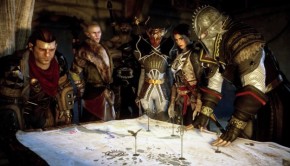Love Week: Hate Plus
NOTE: This article covers major plot points of both Hate Plus and Analogue: A Hate Story. Beware of spoilers!
Hate Plus isn’t your typical game, even when it comes to visual novels. Within the genre, there usually lies a choice the player makes which results in a branching narrative, much like with a Choose Your Own Adventure novel. Once you start a game of Hate Plus, however, your path is set. Your own actions and decisions are meaningless in the grand scheme of things, which is fascinating in that the game itself manages to be more compelling because of that vacuum of power.
 In contrast to Analogue, where the goal was to find out what the disaster was that turned the Mugunghwa into a ghost ship, Hate Plus spends its time exploring the why. The culture aboard the ship pre-Year 0 is dramatically different than the one the Investigator learned about in Analogue, and Hate Plus offers a more comprehensive look at society as a whole. The story doesn’t rely on personal entries alone–political meeting minutes, daily ship logs, and magazine reviews all help to develop an entire world that feels vibrant and lived-in, which in turn provides more insight into the lives of the ship’s constituents. In the end, that contrast makes the Mugunghwa‘s shift to a patriarchal culture harder to cope with, especially knowing the ultimate result.
In contrast to Analogue, where the goal was to find out what the disaster was that turned the Mugunghwa into a ghost ship, Hate Plus spends its time exploring the why. The culture aboard the ship pre-Year 0 is dramatically different than the one the Investigator learned about in Analogue, and Hate Plus offers a more comprehensive look at society as a whole. The story doesn’t rely on personal entries alone–political meeting minutes, daily ship logs, and magazine reviews all help to develop an entire world that feels vibrant and lived-in, which in turn provides more insight into the lives of the ship’s constituents. In the end, that contrast makes the Mugunghwa‘s shift to a patriarchal culture harder to cope with, especially knowing the ultimate result.
This is where the initial choice of playing alongside *Hyun-ae or *Mute colors the entire tone of the game. While Analogue was largely *Hyun-ae’s story, *Mute was able to offer a different perspective of the events as they happened. In Hate Plus, however, conversations with *Hyun-ae are cute and relatable (and push the boundaries of traditional gameplay–hello, cake sequence) but don’t offer the same depth of perspective that comes with actual life experience. It makes sense–Hyun-ae was only 13 when put in cryo-stasis, and 16 when she died and became *Hyun-ae. Wide-eyed teenage authenticity aside, her role is mainly a reactionary one, which makes for a less compelling narrative on its own.
 The real star of the game is *Mute, and this is her story through and through. *Mute–more accurately, an older iteration of the *Mute AI–was alive and prosperous before the Mugunghwa‘s time reset, and watching *Mute reconcile her self-image as the willful “bride” of the ship with her older, brasher self is fascinating. It all culminates in the revelation of Old *Mute’s death at the end of Day 2, a powerful moment that makes *Mute question everything that she holds sacred.
The real star of the game is *Mute, and this is her story through and through. *Mute–more accurately, an older iteration of the *Mute AI–was alive and prosperous before the Mugunghwa‘s time reset, and watching *Mute reconcile her self-image as the willful “bride” of the ship with her older, brasher self is fascinating. It all culminates in the revelation of Old *Mute’s death at the end of Day 2, a powerful moment that makes *Mute question everything that she holds sacred.
It is at that precise moment that Hate Plus reveals its true nature: it is not a prologue to Hyun-ae’s massacre, but a modern, highly experimental take on the traditional dramatic tragedy.
At its most simplified level, dramatic structure consists of a beginning, middle, and end; their corresponding literary terms are exposition, climax, and denouement. Aristotle adds to this in Poetics, where he posits that a tragedy must contain the following to successfully connect with the audience:
- A great protagonist (or hero, in classical Greek drama) who is imperfect, but whose intentions are sincere
- The protagonist must unknowingly make a grave error in judgment (known as hamartia in Greek)
- A event occurs due to said error that results in a reversal of fortune (peripetia) for the protagonist
- The protagonist’s realization of their error and subsequent role in their reversal of fortune (anagnorisis)
- The catharsis, where the protagonist and audience release themselves from their emotions, usually via the protagonist’s death
 The great tragedy of Hate Plus (and arguably Analogue) revolves around *Mute. Before the Investigator came along, *Mute could comfort herself with the knowledge that while the Pale Bride took her purpose away from her, she always served her ship to the best of her abilities and would continue to do so. When confronted with her past life, she makes a point to distinguish herself from it, vehemently decrying any action she finds reprehensible. As more logs surface and she learns more about Old *Mute and the society she worked so hard to protect, it triggers an existential crisis in *Mute.
The great tragedy of Hate Plus (and arguably Analogue) revolves around *Mute. Before the Investigator came along, *Mute could comfort herself with the knowledge that while the Pale Bride took her purpose away from her, she always served her ship to the best of her abilities and would continue to do so. When confronted with her past life, she makes a point to distinguish herself from it, vehemently decrying any action she finds reprehensible. As more logs surface and she learns more about Old *Mute and the society she worked so hard to protect, it triggers an existential crisis in *Mute.
The anagnorisis occurs when she learns that the person she saw as her oldest friend was the one who called for her death, and that every one of her core values was built on a framework of deception. With the knowledge that her current existence is due only to self-preservation, she is unable to reconcile herself with Old *Mute’s actions and chooses to self-terminate via memory wipe.
As with most events of the game, we don’t actually experience *Mute’s death, but the power is still there via the introduction of New *Mute. New *Mute’s role is that of semi-omniscient narrator–she is privy to the events that instigated her “birth,” but only through *Mute’s suicide note. Even though New *Mute refers to herself as such, she harbors no illusions about her actual identity; she acknowledges right away that she too is *Mute, and she wants to learn more about her previous incarnations and their decisions so as to not repeat their mistakes. The introduction of New *Mute hearkens back more to Shakespearean than Greek tragedy, where the death of the protagonist does not signify the end of the story. New *Mute’s desire to move forward offers a note of hope at the end of such a sorrowful tale.
 Christine Love toys with the structure of tragedy in an interesting way. The story still has all the essential elements, but since the narrative is entirely non-linear, there is a risk of the Investigator unknowingly undermining the emotional gravitas of *Mute’s crisis. For example, if the Investigator does not extract any files authored by the Records Council, Heo Seo-young, or Old *Mute before Day 2 ends, they may not understand that *Old Mute is our story’s hero, much less her hamartia, until after her suicide. The most compelling moments of *Mute’s character development are when she confronts her past life and the decisions she had made. Without that knowledge, her decision to end her life carries significantly less weight.
Christine Love toys with the structure of tragedy in an interesting way. The story still has all the essential elements, but since the narrative is entirely non-linear, there is a risk of the Investigator unknowingly undermining the emotional gravitas of *Mute’s crisis. For example, if the Investigator does not extract any files authored by the Records Council, Heo Seo-young, or Old *Mute before Day 2 ends, they may not understand that *Old Mute is our story’s hero, much less her hamartia, until after her suicide. The most compelling moments of *Mute’s character development are when she confronts her past life and the decisions she had made. Without that knowledge, her decision to end her life carries significantly less weight.
Decrypting the data requires a lot of power, so you can only review a limited number of logs every real-time day before the systems must be shut down. While frustrating at first, the real-time breaks from the game are effective as intermissions between acts. As with the theater’s intermission, a break in the action allows events to settle in and achieve a greater effect, creating both tension in the story and anticipation of what’s to come. A prime example of this is the end of Day 2: If *Mute had just excused herself and *New Mute appeared mere moments later, *Mute’s suicide would have seemed rash and impulsive. This way, the Investigator powers down from Day 2 and has a whole day to wonder what *Mute will have to say about everything she’s learned. (It’s entirely possible to override the time constraints, but you run the risk of being a jerkface.)
The intermissions are a welcome break from the overwhelming despair that envelops Hate Plus. It can be hard to process at times, especially when it comes to the issues of gender and sexuality. It’s rare enough to have a game that features same-sex and genderqueer characters in a positive light, much less a normalized one; the same can easily be said for games featuring female characters who exert political, societal, and intellectual power. This makes their eventual undoing all the more agonizing to witness, whether by their own hand or outside forces. The portrayal of same-sex relationships and genderqueer characters in Mugunghwa’s pre-Year 0 society offers a stark contrast to both “modern” Western society and the repressive post-reform society that replaces it.
 Hate Plus doesn’t limit its scope to gender issues, either. Love manages to address economic and class issues, sexual assault, and political corruption as well, and all without lazy generalizations. It would be very easy for a game addressing this many complex topics to deploy them for shock value, but it’s clear that Love has taken the time to develop each character’s narrative to ensure that each of the logs’ authors is more than just an archetype. At the same time, she manages to find a bit of levity here and there, mostly in the Investigator’s inbox and through *Hyun-ae and *Mute’s relationship in the “non-canonical” Harem mode.
Hate Plus doesn’t limit its scope to gender issues, either. Love manages to address economic and class issues, sexual assault, and political corruption as well, and all without lazy generalizations. It would be very easy for a game addressing this many complex topics to deploy them for shock value, but it’s clear that Love has taken the time to develop each character’s narrative to ensure that each of the logs’ authors is more than just an archetype. At the same time, she manages to find a bit of levity here and there, mostly in the Investigator’s inbox and through *Hyun-ae and *Mute’s relationship in the “non-canonical” Harem mode.
Most games are all about taking action and making choices, and Hate Plus turns that concept on its head. In Analogue, the Investigator took an active role in “saving” the AIs and the Mugunghwa, and the player had the option of finding redemption for everyone involved. In Hate Plus, the Investigator is reduced to a casual observer, and the AIs are calling the shots. You are presented with the illusion of choice, but your own actions don’t matter—these horrible thing have already happened, and nothing you tell *Hyun-ae or *Mute can change that. This isn’t your story, it never was, and the game is better for it.










